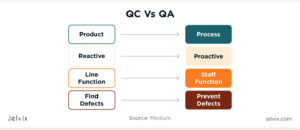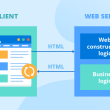When a software company creates a new and innovative application, at first glance, everyone pays attention to the great work done by engineers, designers, and developers. But many do not notice that behind every project without exception, stands a whole team of testers and QA engineers, who are an equally important part of the software development process.
In this article, we will discuss who is a QA engineer, what they do, what are their duties, and what are the main advantages and disadvantages of this profession.
Before moving forward with the story, let’s figure out what exactly the term QA Engineer means.
QA Engineer Job Description
A Quality Assurance engineer is a specialist whose main activities are directed at improving the software development process, preventing defects, and identifying product errors.
The primary task of QA is quality assurance. A QA engineer concentrates on software development stages, fixes them, prevents defects and bugs. In other words, making sure developers are doing the right things, the right way.
Now let’s figure out what stages does the Quality Assurance Process consist of:
- establishing SQA (Software quality assurance) facilitation
- implementing a quality management process
- conducting a process review
- creating a report on the project status
- identifying process improvement areas
- analysis of test results
QA vs QC
Some people may think the term QA is similar to QC (Quality Control). Although the two concepts share some similarities, there are important distinctions between them. QC specialists evaluate test results and are responsible for determining and removing defects of the product. Basically, QC is someone who makes sure the results that you have are the same as expected.

The QA Engineer knows how the system functions, where it does not work, and where it functions not as intended. He understands just how to identify what caused the error, or at the very least understands where to look for it. The more experienced the tester is, the much more interesting and complex the work appears to him.
To give you a simple example, if we were to talk about healthcare, then QA would be engaged in the prevention of illness, and QC would be engaged in diagnostics. These two different jobs became synonymous over time, but I hope I was able to clear things up a bit.
Responsibilities of QA Engineer
If I had my own company or just needed to hire someone, I would probably write the following points in a job description field:
- Requirement analysis and clarification with the client or business analyst
- Compiling a software testing plan
- Writing test cases aka test scripts
- Performing functional testing
- Identification of problematic areas and introduction into the tracking system
- Error lifecycle tracking
- Re-testing of reported bugs
- General testing process optimization
Everyday work routine of QA Engineer
Before coming to this conclusion, I decided to ask some of my friends who work in the QA engineering field. Their typical everyday tasks usually include a lot of team meetings and discussions to gather all the requirements, as well as calls with the clients.

Depending on the phase of the project, QA specialists write test cases and document errors and bugs found. And not to forget, check the bug-tracking system if there have been added any new errors that were fixed by developers.
Doesn’t sound like much, but software testing can actually be a tricky and very time-consuming process.
Advantages and disadvantages
First of all, the QA engineer job sounds fascinating to many people because it allows improving the quality of the product and at the same time mastering different technologies and really diving into the details of the product.
Some of my friends whom I mentioned earlier in this article say that interest in QA does increase over time: at first, they didn’t understand what their team was doing there and for what purpose. To put it simply, the understanding and desire to take on difficult tasks come with the experience.
This profession definitely requires commitment and constant application of analytical skills. Sometimes, it doesn’t let you relax and procrastinate, but instead, it forces you to constantly explore new technologies and areas of knowledge.
Also, many people note that they were attracted to the field of QA because of the possibility to join the world of advanced technologies and high salaries. Some quality engineers came to their profession because they wanted to go into IT, and the QA industry just happened to be simpler to get into. Some people actually find the QA job more interesting and varied than the developer job.
However, some people think that this job can be very monotonous sometimes, especially at the beginning of a career. The most boring tasks reported by Junior QA engineers include passing test cases during manual testing and working with documentation.
What is required of a QA Engineer?
Of course, basic knowledge of testing theory is a must-have. It includes the following:
- What is software testing and what is its purpose?
- What types of testing exist?
- What is a bug and what does its life cycle consist of?
- What types of documentation are used for testing?
Talking about some personal qualities, it is necessary to:
- Have an interest in IT and a desire to learn new things
- Be able to communicate – the quality of communication in the development team directly affects the quality of the software
- Be attentive to details, assiduous, responsible, and persistent
- Have analytical skills, be able to model and work with abstractions
- Have a critical or even “destructive” mindset aimed at finding mistakes

How to start a QA specialist career?
Start off with gaining some basic knowledge – read books, articles, blogs. Basically all the useful information you can get. My personal favorites:
- Testing Object-oriented Systems: Models, Patterns, and Tools by Robert V.Binder
- How to Break Software: A Practical Guide to Testing by James Whittaker
- Software Testing: A Craftsman’s Approach 3rd Edition by Paul C. Jorgensen
For programming languages, I recommend learning the most popular languages used for testing, such as Python, Java, JavaScript, C#, etc. The knowledge of HTML, SQL, and CSS can be a great plus as well. I feel like with a lot of dedication and determination you will succeed in the industry of QA and quickly rise in your career.
Among the most important responsibilities of a QA engineer is boosting the quality of the development process, and therefore they must be a flexible specialist. They may perform roles of:
- Software engineer – an understanding of the technical restrictions for the execution of a particular functionality and also a minimal required understanding of the code
- Business analyst – understanding of the market as well as the target audience
- Project Manager – understanding of the integrity of all parts of the project. Likewise, it requires the capability to look at the product from the end-user point of view







